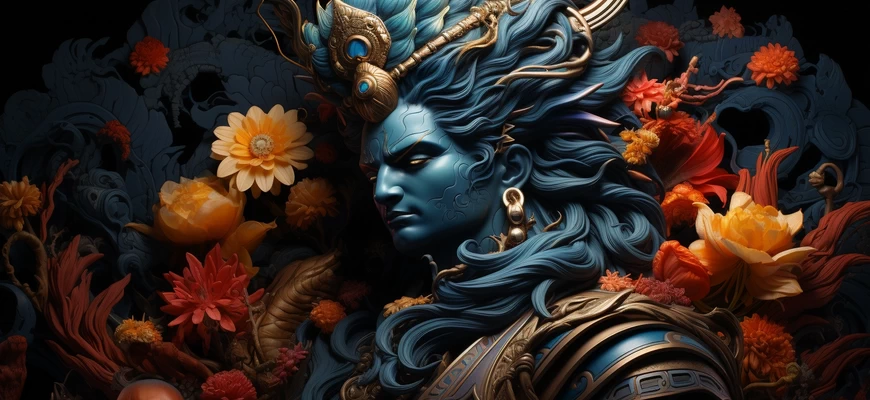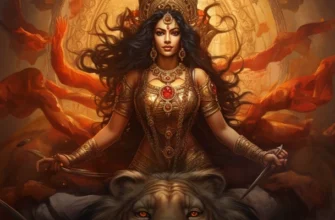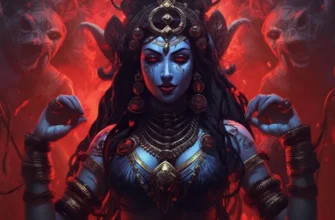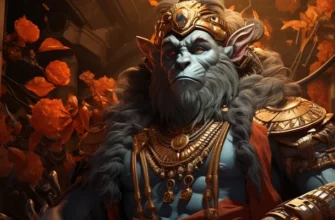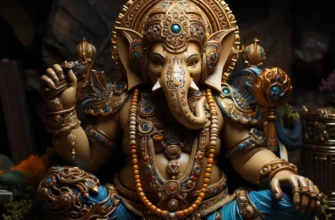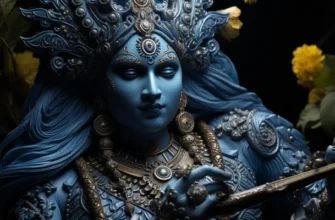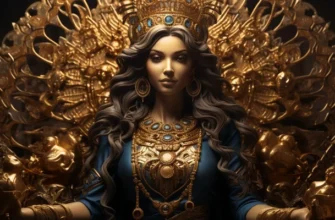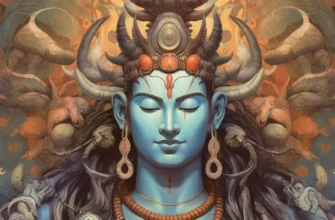Vishnu is one of the most important gods of Hinduism. He is considered the god of preservation and harmony in the universe. He is often depicted with four hands, each holding symbolic objects. Vishnu legends often tell of his incarnation to fight evil and preserve the world. His cult remains an important part of modern Indian culture.
- Hinduism: cultural and religious context
- Legends about the origin of Vishnu
- Myths related to his incarnations and actions
- Aspects of the divine personality
- Vishnu as the guardian god and sustainer of the world
- Incarnations and attributes
- God’s attributes and their meanings
- The cult of Vishnu
- Rites and practices associated with Vishnu worship
- Shrines and temples dedicated to him
- Vishnu in modern times
- The influence of Vishnu cult on contemporary Indian culture and society
- Conclusion
Hinduism: cultural and religious context
Hinduism, one of the oldest religions in the world, forms a complex cultural and religious context for the god Vishnu. This religion is characterized by a variety of gods and goddesses, various rituals and practices that influence the perception of Vishnu as a god of preservation and harmony. His role in the triad of gods, which also includes Shiva and Brahma, is an important component of Hindu cosmology and mythology.Introduction to the gods and goddesses of Hinduism
Vishnu, according to Indian mythology, is one of the most important gods of the triad along with Brahma and Shiva. According to legends, he has several incarnations (avatars), including Rama and Krishna. Legends about Vishnu are often related to his fight against evil, protection of good, and preservation of cosmic harmony. His mythological stories are an integral part of Indian culture and religion.
Legends about the origin of Vishnu
According to Indian legends, Vishnu emerged from the cosmic ocean during the creation of the world. In his first incarnation, he took the form of a fish to save the world from the flood. The legends of his origin give him the status of a savior god and protector of all things.
Myths related to his incarnations and actions
Vishnu appears in numerous myths and legends associated with his various incarnations (avatars). For example, the myth of Rama, who is known for his wisdom and justice, or the myth of Krishna, which tells of his heroic deeds. These myths emphasize Vishnu’s role in preserving cosmic harmony and restoring goodness in the world.
The Rama myth centers around the heroic adventures and rule of Rama, who is an incarnation of Vishnu. He is recognized for his devotion, wisdom and righteousness. The legendary epic Ramayana tells of his fight against the demon Ravana to save his wife Sita. The myth of Rama is often used to promote the values of justice, morality, and fortitude.
Aspects of the divine personality
Vishnu, as a deity, is known for his majesty and mercy. His divine personality is reflected in various aspects, such as his protective nature, commitment to justice, and capacity for mercy. He symbolizes harmony and balance in the cosmos, which acts as an inspiration for his followers in achieving spiritual and harmonious life practices.
Vishnu as the guardian god and sustainer of the world
In Indian mythology, Vishnu is considered to be the guardian god and sustainer of the world. He intervenes in cosmic events to maintain the balance of good and evil. According to legends, his incarnation is meant to destroy darkness and crime, to ensure prosperity and harmony in society. His role as a guardian god reflects his recognition as an important symbol of salvation and rebirth.
In the triad of Hindu gods, Vishnu appears alongside Brahma and Shiva. He represents the aspects of preservation and maintenance in the universe, while Brahma creates the world and Shiva destroys to bring about transformation. Vishnu is a symbol of harmony and preservation, which promotes balance and stability in the universe. This triad reflects the basic aspects of creation, preservation, and destruction in the universe, which are key concepts of Hinduism.
Incarnations and attributes
In incarnations known as avatars, Vishnu appears in various forms to save the world from evil and restore cosmic harmony. Some of his famous incarnations include Rama, Krishna, Parashurama, and others. He is often depicted with four hands holding symbolic objects such as a disk, lotus, and a brand. These attributes symbolize his power, wisdom, strength, and control over the universe.
God’s attributes and their meanings
Vishnu has numerous attributes, such as the disk (chakra), lotus (padma), mark (gada), and concha (shankha), which have deep symbolic meaning. The disk symbolizes strength and determination in overcoming evil. The lotus represents purity and spiritual development. The brand represents power and strength, while the conch symbolizes the inner sound of the universe. These attributes emphasize important aspects of his divine personality and role in maintaining cosmic harmony.
The cult of Vishnu
The cult of Vishnu includes a variety of rituals, shrines, and religious practices that reflect his important place in Indian religious and cultural heritage. His followers honor him through prayer, song, and ritualistic acts in temples dedicated to him. Shrines such as Tirupati and Vaikuntha serve as centers of Vishnu worship where devotees gather for devotional practices and religious rites.
Rites and practices associated with Vishnu worship
The rituals and practices associated with the Vishnu cult include many different religious activities. This includes prayers, songs, meditation, reading sacred texts, performing religious rites and ceremonies such as puja (ritual worship), archana (offerings), abhiseka (pouring holy liquids), and festivals dedicated to his veneration. These practices help believers deepen their spiritual connection with God and receive his blessings.
Shrines and temples dedicated to him
Among the prominent shrines and temples dedicated to the god Vishnu is Tirupati in India, which is considered the most famous and revered temple of Vishnu. Other important shrines include Venkateshwara Temple in Tirumala, Badrinaath in the Himalayas, and Vaikuntha Perumal Temple in Kanchipuram. These shrines attract pilgrims from all over the world to pay homage to God Vishnu and receive his blessings.
Vishnu in modern times
Vishnu remains an important symbol of spirituality and cultural heritage in contemporary Indian society. His cult continues to influence the religious and cultural life of millions of believers who honor him through rituals, shrines, and festivals. In addition, he leaves his mark on modern forms of art, literature, and the film industry, which maintains his popularity and influence on contemporary Indian culture.
The influence of Vishnu cult on contemporary Indian culture and society
The Vishnu cult continues to have a significant impact on contemporary Indian culture and society. He contributes to the formation of spirituality, morality, and values in Indian society through his role as the god of preservation and harmony. His cult and shrines attract pilgrims and believers from all over the world, which contributes to the development of tourism and religious pilgrimage. In addition, the influence of Vishnu’s cult can be seen in contemporary Indian music, art, literature, and film industry, which demonstrates his enduring influence on the country’s cultural landscape.
Vishnu continues to play an important role in contemporary religious and cultural practices in India. His cult is actively practiced by millions of devotees through prayers, religious rituals, and participation in festive festivals such as Janmashtami and Diwali. Vishnu remains a central symbol of spirituality, morality, and well-being for believers, which continues to reflect his important place in contemporary Indian religious practice and culture.
Conclusion
Vishnu plays an integral role in Indian culture and religion, symbolizing preservation, harmony, and spiritual well-being. His cult is reflected in mythology, rituals, shrines, and practices that emphasize his greatness and importance in the world’s religious heritage. Through his incarnations and symbolic attributes, Vishnu inspires believers to spiritual development and commitment to moral values, making him an integral part of India’s cultural landscape.
Vishnu’s contribution to the world’s religious heritage is manifested through his unique role in maintaining harmony and balance in the universe. His incarnations and mythological stories inspire believers to develop spiritually and to commit to moral values. Vishnu leaves an important mark on the world’s religious heritage through his symbolic attributes and practices that offer wisdom and devotion to believers around the world. His contributions are reflected in the universal values of love, mercy, and moral improvement, making him a central figure in the world of religion and spirituality.
